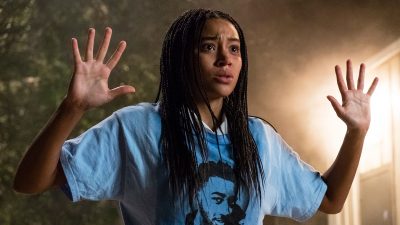
Starr Carter lives two lives. By day, she’s a student at an upscale private high school, one of the few black kids, with a peer group that’s all white, including her boyfriend. By night, she’s part of a working-class black community in Garden Heights, where she lives with her mother Lisa and father Maverick, who have sent her to that private school to get a better education and environment than what’s offered in their neighborhood. Starr’s friends at school don’t know anything about her home life. She never invites them over, never says where she lives, never speaks in a way that might betray her hidden truth. It’s a world the privileged white kids know nothing about.
Early in “The Hate U Give,” Maverick sits Starr and her two brothers down for The Talk. It’s not about sex, it’s about survival, as he explains what to do if you’re stopped by a police officer to avoid getting shot. He tells them how to maintain their dignity without giving the officer any reason to consider them a threat. He also teaches them the Ten-Point Program — written in 1966 by Black Panthers Bobby Seale and Huey Newton — to give them more of a sense of empowerment.
Not long after, Starr goes to a party in her neighborhood with her best friend, where she runs into Khalil, a guy she’s known her whole life but lost touch with. As they’re reconnecting, they hear gunfire and, along with most of the other people at the party, get out of there as quickly as possible. Khalil offers Starr a ride home, a trip that’s interrupted by a police car’s lights and siren behind them.
Khalil pulls the car over and Starr immediately puts her hands on the dashboard, just like her father taught her to. She implores Khalil to do the same, to take this seriously so nothing happens to either of them. But Khalil gives the officer a little too much attitude and is ordered to step out of the car, put his hands on the roof, and stay in that position. When the cop returns to the patrol car to run a check on his ID, Khalil takes his hands off the car and reaches inside for his hairbrush. Starr begs him to do what he’s told, but he ignores her, and as he stands up, shots ring out. The officer, thinking Khalil had a weapon, has killed the unarmed boy.
The incident echoes the stories of other young black men who died from the actions of white cops: Tamir Rice, Eric Garner, Philando Castile, Alton Sterling, and more. Starr knows about all of them, but this one shakes her to the core for several reasons. One, she’s just lost a longtime friend. Two, she’s the only witness. Three, this may rip apart the thin fabric of her dual-identity life.
Those three elements play out over the rest of “The Hate U Give,” which draws its title from a Tupac Shakur tattoo of the acronym THUG LIFE, which stands for The Hate U Give Little Infants Fucks Everybody. Now Starr must balance the anger of her family and black neighborhood with the reaction of the white kids she sees every day, none of whom know that she is The Witness. As her internal struggle simmers, you can sense it beginning to boil over as she has to decide whether to testify to a grand jury looking into Khalil’s murder. Before doing so, she talks to her uncle Carlos, a black police officer who sides with the cop who shot Khalil, but can’t fully justify it to Starr when she keeps asking what he would have done in that situation, and how it would have been different if Khalil was white.
As Starr, Amandla Stenberg gives a terrific and tragic performance, one of the best I’ve seen this year. Her parents, who didn’t want any of this for their family, are played by the always-reliable Regina Hall and Russell Hornsby. Anthony Mackie plays a menacing drug dealer named King, for whom Khalil worked because there weren’t any other jobs in their part of town. Issa Rae brings intensity to her role as April, a Black Lives Matter activist and lawyer who organizes protests and wants to help Starr through this difficult period. There’s also good work by Algee Smith as Khalil and Common as Carlos. In fact, there’s not a bad performance in the movie.
Credit for that goes to director George Tillman Jr., working from a script by Audrey Wells (who sadly died of cancer at 58 just before the movie was released), who adapted the novel by Angie Thomas, who was clearly inspired by the stories that became the Black Lives Matter movement. As “Blindspotting” did earlier this year (my review is here), “The Hate U Give” offers real insight into the fears, frustrations, and fraught circumstances in which lives can be abruptly changed at any time by a single bullet. It is thought-provoking and right for its time, one of the best movies of the year, and I can’t praise Stenberg enough for her leading role.
I give “The Hate U Give” a 9 out of 10.
